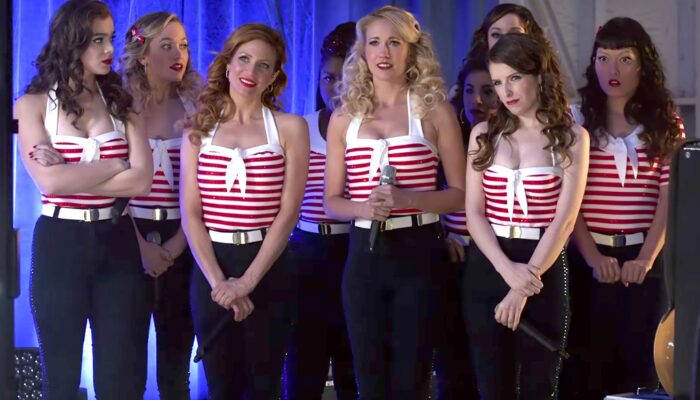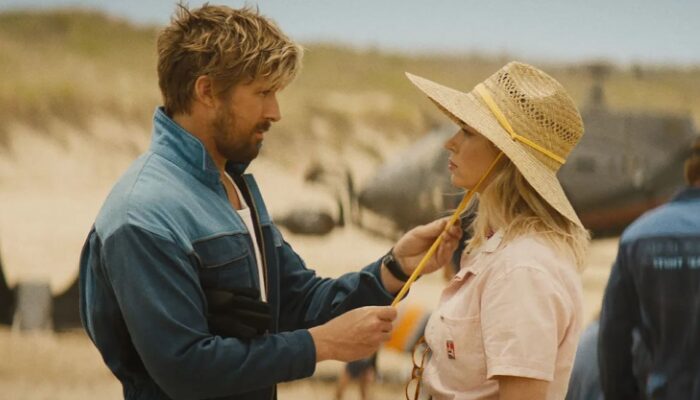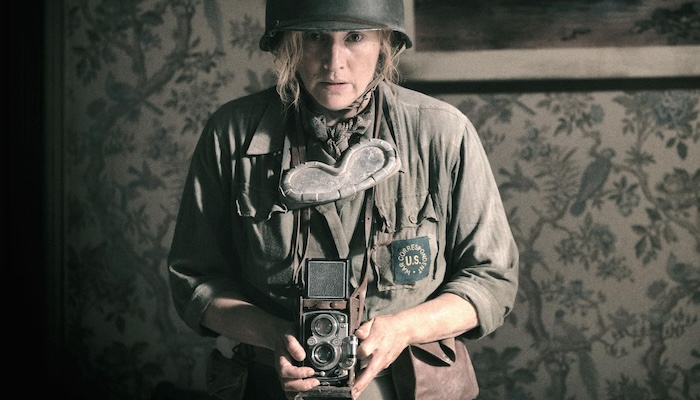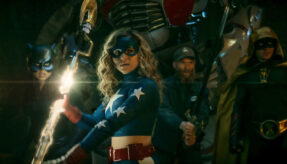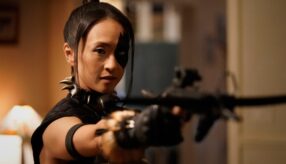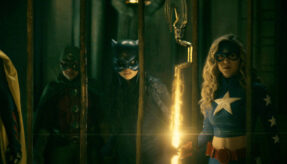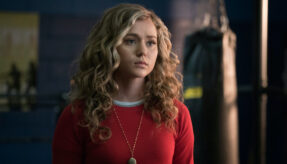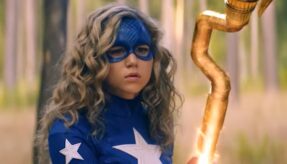TV Review: STARGIRL: Season 1, Episode 1: Pilot [DC Universe, The CW]
Table of Contents
Stargirl Pilot Review
DC Universe and The CW’s Stargirl: Season 1, Episode 1: Pilot is the beginning of wasted story potential and on-screen talent for a fledgling superhero TV series.
Like Captain Marvel, Stargirl possesses good and bad plot elements. Also like Captain Marvel, Stargirl’s bad plot elements far out-weigh the small amount of good in the heroine’s premiere on-screen outing.
In the first moments of Stargirl, its writer establishes the tone of the TV series. Stargirl is not a Hard-R TV series like Titans, nor does it take itself seriously like Arrow. Stargirl is more in-line with Doom Patrol but doesn’t achieve that sought-after balance between comedy, action, and serious human moments that Doom Patrol effortlessly achieves.
Stargirl is all over the place in its opening sequence. At first it’s goofy and slapstick, then a surreal superhero bonanza, then a serious moment occurs peppered with a repeated “not you” joke.
Wacky Lead-up and The Waste
A TV show only has one opportunity to make a first impression on the viewer. Stargirl makes two coterminous first impressions. One first impression is that of an infinitely goofy sidekick who exudes ineptitude and being out of his depth, doing the opposite of what his superhero best friend tells him to do. Patrick “Pat” Dugan / Stripesy (Luke Wilson)’s ernest goofiness severely hurts the opening scene’s seriousness (thus the viewer’s engagement) at the series’ outset.
What kills this pivotal scene is Dugan inexplicably saying who each superhero character is when he runs into their dying incarnation. It’s asinine. It’s purpose is clear – announce who this person is to the viewer but it’s done in the most obvious, sloppy way possible.
Dugan knows who all of them are. Why is he saying who each of them is out loud on a battlefield (giving away his position to the enemy – showing he’s had no training), especially if the person he is talking to on the ground is a corpse?
The second impression delivered is that the writer of this episode, Geoff Johns, isn’t capable of recognizing a fantastic opportunity when he stumbles into it (why not plan it?) and exploiting it to its full, comic book-orgasm potential. Stargirl could have shown Justice Society of America in multiple scenes in all of their glory, their individual personalities on display as they talk about the upcoming mission that gets them all killed, what their roles would be during it, etc.
None of that happens in Pilot. Zero.
The producers of Stargirl didn’t tell its writer: show Justice Society of America, show why they are a great superhero team, and show the mark they have made on the world. Build them up before you kill them off so their deaths are felt (to some extent, even in a minuscule way), and their presence is missed. In Stargirl, most of Justice Society of America is killed off as they are introduced to the viewer. The others are killed off-screen, their dead bodies strewn over the ground (I am sort of making this scene sound good in a macabre sort-of-way. It isn’t.).
It is a completely missed opportunity to bring those heralded heroes to life on-screen. Hopefully this will be corrected through flashbacks but I don’t see how – these characters have absolutely no connection to Stargirl except through Starman and the walking noob a.k.a. Pat Dugan.
Because of the aforementioned factors, the opening battle sequence of Stargirl is a joke. Why write superheroes that are woefully inept fighting bad guys so coordinated and powerful? Why write boob superheroes completely in over their heads instead of heroes of grit, caliber, and competence like Lord Commander Gerold Hightower, Ser Oswell Whent, and Ser Arthur Dayne from A Song of Ice and Fire? If you are going to write a last stand scene, write it like The Tower of Joy, write it like George R.R. Martin, not like a dyslexic cartoonist rendering a Screwy Squirrel, whack-a-mole sequence for MGM Cartoons.
The Forever Sidekick
Pat Dugan is the everyman of Stargirl, the viewer can see this classic archetype, but he is also insanely vapid. In the ten years following Starman’s death, why doesn’t Pat spend that time proving Starman wrong, that he is worthy of a superhero mantle, of his respect, and of the cosmic staff?
Pat doesn’t bother to build himself up, physically or mentally, in all of that time. He doesn’t put in any work into himself.
One would have thought that the death of Starman, his best friend and a superhero, not to mention the death of an entire superhero team, would have had a profound effect on Pat. What if Pat suffered from PTSD (e.g. violent flashbacks, trouble sleeping, medication) because of those tragic events?
These two character traits, self-actualization and trauma, would have made Pat’s character more substantive and would have generated a love / hate relationship with Stargirl – Pat wants to be the next Star hero, envies, and resents that it is Courtney. Then he gradually gains respect for her and her abilities as time goes by.
Instead of all this, instead of this dynamic between Pat and Stargirl, Pat is just an ordinary guy whose blandness and lack of zeal doesn’t retain the viewer’s attention. He is an Average Joe. Standard. Nothing special. Forever destined to exist in the unbreakable sidekick bubble.
If he had actually been given a personality, aspirations, and goals, Pat Dugan could have been the best character on the series – think Carol Peletier from The Walking Dead, and how that character evolved through her myriad of experiences. Courtney Whitmore is the hero and the focus of Stargirl, there is no doubt about that, but well-written sub-characters make a story far richer, far better. Carol’s arc proves this fact. That could have been Pat Dugan with his days with JSA beginning that change, the death of Starman kicking it into a high, sustained gear, and the ten years leading to Stargirl’s emergence his incubation period.
Nope.
Instead, Pat is exactly the same guy ten years later…only now with a robot exoskeleton.
The Fish Out of Water
Stargirl leans heavily on its tropes, none more so than the newcomer, fish-out-of-water trope – the protagonist in a new environment gets introduced to new characters, situations, etc. and thus introduces them to the audience. It’s Screenwriting 101 or 434 in this case (thanks Lew Hunter). The viewer has seen this scenario before in countless iterations e.g. auteur Guillermo del Toro’s Hellboy. What saves this recycled scenario from itself in Stargirl is Courtney Whitmore / Stargirl (Brec Bassinger). Bassinger brings something, I don’t know what (a spark maybe, cliche as that might sound), to a bland character. Bassinger’s facial expressions, grievances, and annoyances as Courtney Whitmore are all recognizable.
I wish, as a viewer and as a potential fan, that I was given the chance to know Courtney before she and her family moved. That would have given the viewer the opportunity to see the “protagonist at rest” in her normal environment with her friends and on the school gymnastics team.
Then have all of that taken away by the move announcement.
Have Courtney’s parents sit her down and tell her that they are moving, even-though this is the year she is up for Varsity Captain on her gymnastics team, a position that she has earned through ten years of hard work and endless practices. Have Courtney aiming for a gymnastic’s college scholarship through her performance this year on the gymnastics team as Captain. Have all of that taken away from her by the move and the fantastic financial opportunity that her mother and step-dad can’t pass up.
Enumerate what Courtney lost. Make it real. Make it a terrible sacrifice that she resents to the core of her being. Heck, have her try to emancipate herself from her parents so she can stay at her school and be Varsity Captain.
Use this situation as a fulcrum to show her spirit and determination outside of being a superhero.
Then throw her into a foreign environment. Then give her the cosmic staff, then give her superpowers.
None of this happens in Stargirl and I don’t know why. I just pulled these ideas literally out of thin air and they are far better than what is in this episode. The person that wrote this episode, Geoff Johns, went to school for screenwriting and none of the aforementioned fertile narrative ground seems to have occurred to him. Johns is so busy getting the cosmic staff into Courtney’s hands as soon as possible he skips the vast areas of character building that he could and should have done beforehand.
In place of seeing Courtney’s loss because of the move, the viewer is told of it, in passing no less, breaking a cardinal rule of screenwriting – “show, don’t tell.”
The Follies
Pat, the court jester of Stargirl, the King’s Fool (“I kept his suit clean.” Lol.), carries out the most hilarious set of circumstances in Pilot. Here is a ex-superhero sidekick living in seclusion, and he leaves his secret superhero sidekick stuff all around his new basement, unlocked, in easy access picture frames, containers, and boxes.
As a viewer of television shows and films, you have never seen anything so stupid in your entire life. Pat’s sidekick and superhero paraphernalia is pathetically concealed as if he is a child and those around him are incurious babies.
Why not keep all of your superhero stuff with your robot exoskeleton?
Why not keep all of your superhero stuff in a locked storage container?
Why not keep all of your superhero stuff in a large lock box in a bank vault?
Why not keep all of your superhero stuff in an air-tight, vacuum-sealed bag in the ground?
Why not keep it anywhere except where civilians traipse?
It’s so dumb.
Dare Me
Imagine, for a moment, if Stargirl had edge and bite, like a shot of something naughty off an area even naughtier. Ponder, as you read this, if Courtney Whitmore wasn’t a mere comely milk shake who falls into the family business. What if Whitmore was like a female athlete from the TV show Dare Me and this Stargirl, comic book universe came enhanced with that show’s real-world-temerity, sexuality, gloom, and light? That would be a powerful human drama TV series, with good superhero aspects, a narrative one, two punch. If Titans put DC Universe on the map, that Stargirl TV series would have solidified it as the new go-to place for grown-up superhero television (following the demise of Daredevil and company on Netflix). That is not the Stargirl television series that the viewer gets, not even when the cosmic staff gets violent and takes out a car. No. The version of Stargirl that the viewer gets courtesy of screenwriter Geoff Johns is safe, ordinary, and unremarkable. This superhero TV series is plain and by-the-numbers in the most uninteresting ways possible. It’s not a triumph in any way. It’s a waste.
Conclusion
Stargirl‘s pilot episode is far better than Batwoman‘s terrible initial outing but inferior to Supergirl‘s mediocre debut episode. This is no achievement and certainly nothing of which to be proud.
Leave your thoughts on this Stargirl Pilot review and this episode of Stargirl below in the comments section. Readers seeking to support this type of content can visit our Patreon Page and become one of FilmBook’s patrons. Readers seeking more Stargirl can visit our Stargirl Page, our The CW Page, and our The CW Twitter Page. Readers seeking more TV show reviews can visit our TV Show Review Page and our TV Show Review Twitter Page. Want up-to-the-minute notification? FilmBook staff members publish articles by Email, Twitter, Instagram, Tumblr, Pinterest, and Flipboard.
Related Articles
FilmBook's Newsletter
Subscribe to FilmBook’s Daily Newsletter for the latest news!

